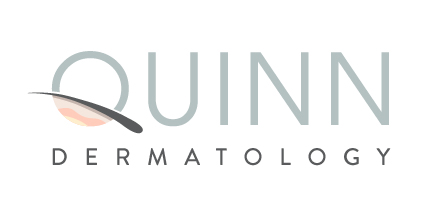25 Sep Treating Adult Acne
 Dermatologists can offer various effective treatments for adult acne, tailored to the specific needs and severity of the individual’s condition.
Dermatologists can offer various effective treatments for adult acne, tailored to the specific needs and severity of the individual’s condition.
The following treatments are common approaches used by Dr. Quinn and his dermatology staff when treating adult acne:
Topical Treatments:
- Retinoids: Derived from Vitamin A, retinoids unclog pores, reduce inflammation, and promote cell turnover, preventing new acne lesions. Examples include tretinoin, adapalene, and tazarotene.
- Benzoyl Peroxide: This antibacterial agent helps kill acne-causing bacteria, reduce inflammation, and unclog pores.
- Topical Antibiotics: Antibiotics like clindamycin and erythromycin can be applied to the skin to reduce bacteria and inflammation associated with acne.
- Salicylic Acid: It helps unclog pores and is effective in treating blackheads and whiteheads.
Oral Medications:
- Antibiotics: Oral antibiotics like doxycycline, minocycline, or tetracycline can help control bacteria and reduce inflammation.
- Hormonal Treatments: For women, hormonal therapies like birth control pills or spironolactone can be effective in regulating hormones that contribute to acne.
- Isotretinoin (Accutane): A potent medication used for severe acne that is unresponsive to other treatments. It significantly reduces sebum production and is usually reserved for severe cases due to potential side effects.
Procedural Treatments:
- Chemical Peels: Dermatologists can apply chemical solutions to the skin to exfoliate dead skin cells, unclog pores, and reduce acne.
- Laser or Light Therapy: Various laser and light therapies can target and destroy acne-causing bacteria, reduce inflammation, and promote healing.
- Microdermabrasion: A procedure that uses a machine to gently exfoliate the top layer of skin, helping to improve the appearance of acne scars and unclog pores.
- Extraction: Dermatologists can perform manual extraction of blackheads and whiteheads to clear pores.
Intralesional Injections:
Injections of corticosteroids directly into inflamed acne lesions can quickly reduce inflammation and improve the appearance of cysts or nodules.
Combination Therapy:
Dermatologists often prescribe a combination of topical, oral, and procedural treatments to address different aspects of acne and optimize results.
Skincare Guidance:
Dermatologists can provide personalized skincare routines and recommendations to help manage acne and prevent future breakouts.
It’s important to work closely with a dermatologist to determine the most appropriate treatment plan for your specific type and severity of adult acne. At Quinn Dermatology, we will consider factors such as medical history, lifestyle, and potential side effects of treatments before recommending a course of action. We’ll also continue monitoring and tracking your skin health and adjust the treatment plan as needed. Schedule an appointment today to get started.


